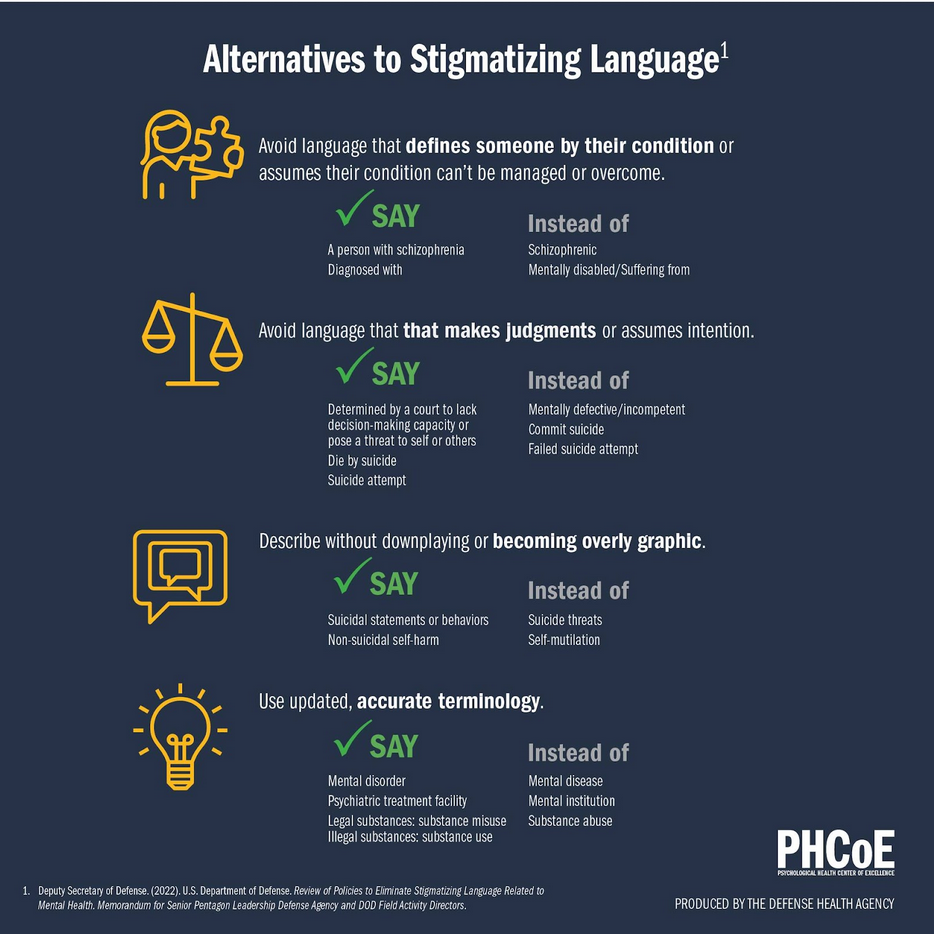Staff Perspective: Language that Heals, Not Harms
Behavioral health providers are crucial in combating the stigma that prevents service members from seeking mental health care. However, providers can inadvertently perpetuate this stigma through their language and tone. Phrases such as “depressed people,” “suffering from,” “mental illness,” or even casual remarks that minimize symptoms can alienate military clients who are already reluctant to engage. The most recent Department of Defense Health Related Behaviors Survey (2021) revealed that 1 in 4 active-duty personnel reported mental health concerns, yet fewer than half sought treatment, frequently citing fear of judgment. Providers, who adopt strength-based communication that recognizes the impact of individual differences, are vital in changing this dynamic and improving access to care.
Consider the perspective of a military member who silently experienced symptoms of PTSD for years. This individual avoided counseling, convinced it would damage their reputation and stall their military career. When a behavioral health provider embedded within their unit started using mission-ready terminology, framing mental health as “tactical readiness” and therapy as “resilience training,” the individual finally sought help. This not only alleviated their symptoms, but also enhanced their performance, prompting others in the unit to reflect on their own well-being. Such stories underscore that altering our approach to discussing mental health is not merely ethical, but also highly effective.
One tool that you can put in your toolbox to support this effort is the Mental Health Stigma Reduction Toolkit from the Psychological Health Center of Excellence (PHCoE). This comprehensive, evidence-based guide offers strategies for reducing stigma in various military settings. It provides templates, leadership messaging, and advice for refining clinical language to encourage engagement. Providers can actively dismantle barriers to care by integrating this toolkit and consistently using respectful, empowering language that highlights mission-readiness and resilience. In doing so, we not only support the individual but also bolster the strength of the entire force.

Source: Psychological Health Center for Excellence
The opinions in CDP Staff Perspective blogs are solely those of the author and do not necessarily reflect the opinion of the Uniformed Services University of the Health Science or the Department of Defense.
Annie Layden, LICSW, is a licensed clinical social worker working as a Military Behavioral Health Social Worker for the Center for Deployment Psychology at the Uniformed Services University of the Health Sciences in Bethesda, Maryland.
Sources:
U.S. Department of Defense. (2021). 2018 Health Related Behaviors Survey: Mental and Emotional Health Among the Active Component. https://www.rand.org/pubs/research_reports/RR4222.html
Psychological Health Center of Excellence. Mental Health Stigma Reduction Toolkit. https://www.health.mil/PHCoE
Behavioral health providers are crucial in combating the stigma that prevents service members from seeking mental health care. However, providers can inadvertently perpetuate this stigma through their language and tone. Phrases such as “depressed people,” “suffering from,” “mental illness,” or even casual remarks that minimize symptoms can alienate military clients who are already reluctant to engage. The most recent Department of Defense Health Related Behaviors Survey (2021) revealed that 1 in 4 active-duty personnel reported mental health concerns, yet fewer than half sought treatment, frequently citing fear of judgment. Providers, who adopt strength-based communication that recognizes the impact of individual differences, are vital in changing this dynamic and improving access to care.
Consider the perspective of a military member who silently experienced symptoms of PTSD for years. This individual avoided counseling, convinced it would damage their reputation and stall their military career. When a behavioral health provider embedded within their unit started using mission-ready terminology, framing mental health as “tactical readiness” and therapy as “resilience training,” the individual finally sought help. This not only alleviated their symptoms, but also enhanced their performance, prompting others in the unit to reflect on their own well-being. Such stories underscore that altering our approach to discussing mental health is not merely ethical, but also highly effective.
One tool that you can put in your toolbox to support this effort is the Mental Health Stigma Reduction Toolkit from the Psychological Health Center of Excellence (PHCoE). This comprehensive, evidence-based guide offers strategies for reducing stigma in various military settings. It provides templates, leadership messaging, and advice for refining clinical language to encourage engagement. Providers can actively dismantle barriers to care by integrating this toolkit and consistently using respectful, empowering language that highlights mission-readiness and resilience. In doing so, we not only support the individual but also bolster the strength of the entire force.

Source: Psychological Health Center for Excellence
The opinions in CDP Staff Perspective blogs are solely those of the author and do not necessarily reflect the opinion of the Uniformed Services University of the Health Science or the Department of Defense.
Annie Layden, LICSW, is a licensed clinical social worker working as a Military Behavioral Health Social Worker for the Center for Deployment Psychology at the Uniformed Services University of the Health Sciences in Bethesda, Maryland.
Sources:
U.S. Department of Defense. (2021). 2018 Health Related Behaviors Survey: Mental and Emotional Health Among the Active Component. https://www.rand.org/pubs/research_reports/RR4222.html
Psychological Health Center of Excellence. Mental Health Stigma Reduction Toolkit. https://www.health.mil/PHCoE

